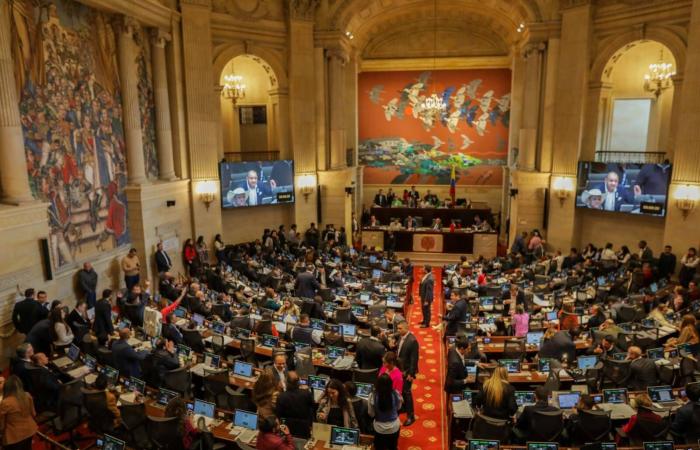May Bogotá become a free port for all the country’s liquors. That is the new proposal that arises from the Council so that the city no longer depends on the authorities of Cundinamarca, and that popular drinks, such as Yellow Brandy, can be sold freely in the city.
According to the criteria of
The reason why this liquor from the Caldas Liquor Industry (ILC) stopped being marketed in Bogotá and the region is because it must first be authorized by the government of Cundinamarca. Although this permit had initially been granted, it was decided to be revoked approximately a year ago, in June 2023.
To get liquor here from somewhere else, you have to go through this company, which puts the seal on the lid so that it can be marketed.
But why does the capital depend on this authorization? Article 31 of the Cundinamarca Revenue Statute (Ordinance No. 039 of 2020) states that The departmental authorities control “the production and introduction of national and foreign distilled liquors in the jurisdiction of the department, including the Capital District.”
It also indicates that the department exercises a distribution and marketing monopoly regarding the distilled liquors that it produces directly, through the Cundinamarca Liquor Company (ELC), and that the profits obtained from these products They are intended for education and health, and the protection of public health.
Councilor Juan David Quintero’s trill about Yellow Liquor.
Photo:x: JD_Quinteor
“To enter liquor here from somewhere else, it has to go through this company, which puts the seal on the lid so that it can be marketed,” explained Juan José Gómez Urueña, an expert lawyer in state contracting.
However, for New Liberalism councilor Juan David Quintero, who wants to put the issue back on the table, this control “hinders” free competition and the free market, especially for liquor.
“Bogotá is the capital district of all Colombians, therefore it should be a free port,” stated the lobbyist for EL TIEMPO.
However, changing these rules is not easy, since The profitable monopoly of distilled liquors is in article 336 of the Constitution. In addition, it is regulated by Law 1816 of 2016.
A figure that has existed since the colony
This scheme in the liquor market was created in the 18th century, and has been established in both the Colombian Constitution of 1886 and that of 1991.
It is an absolutely anachronistic figure, which today does not even apply to rum, it applies exclusively to brandy.
“It is an absolutely anachronistic figure, that today rum is not even applied to it, it is applied exclusively to liquor and what it is generating is that the ELC, absolutely controlled by the Government of Cundinamarca, decides what is sold and what is not sold in the largest market in Colombia,” said Quintero.
Although this money has a social function, the councilor affirms that he does not agree with the way it is managed in Cundinamarca and the capital, since Law 1816 establishes that Bogotá receives only 10.5 percent of the ELC’s profits, which must be allocated to health (88%) and sports (12%).
For example, in 2019, the last year for which the ELC has public information, this company had a net profit of 62,781 million pesos from the sales of Santafe Rum and Néctar brandy, and delivered 6,592 million pesos to Bogotá.
Nectar brandy
Photo:iStock
In addition, the capital, according to article 9 of Ordinance Decree 435 of 2020, does not have participation in the Board of Directors of the liquor store.
“The rent monopoly violates territorial autonomy. It cannot happen that the ELC, because it is not doing well, prohibits, bans, other products, such as the case of Yellow Spirit, to avoid free competition, which is embodied in the Constitution,” Quintero added.
Could the rent monopoly be eliminated?
The councilor stated that he will file “a lawsuit for unconstitutionality” so that the figure of the rent monopoly is “corrected.”
According to Gómez Urueña, “any change intended in this matter has to be through law, in the Congress of the Republic, it cannot be determined by a departmental assembly or a district council.”
A change in the law on the issue would have to be approved by Congress.
Photo:César Melgarego. TIME
He stressed that the discussion is not simple, since “the territorial entities would immediately lose important resources to finance health and education policies,” which is why he finds it difficult for the representatives of the different departments to vote to eliminate this figure.
Furthermore, he stated that it is a debate that has already occurred in the courts before. “The laws, to see if they are constitutional or not, must be analyzed by the Constitutional Court. This has already heard lawsuits in which it has been concluded that the legislator can effectively regulate this matter and that this form of regulation is not a measure that affects free competition, so any lawsuit is practically destined to fail.
It should be noted that, although the liquor monopoly works in other countries such as Sweden, Finland and Canada, in Latin America some governments have released these measures and have opted for regulatory councils for certain drinks, as is the case of Tequila in Mexico. , Pisco in Peru, Pisco in Chile and Cachaça in Brazil.
LAURA VALENTINA MARKET
BOGOTÁ EDITORIAL
X: @lauramerher1







